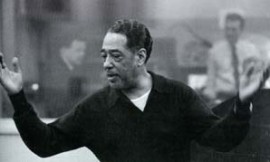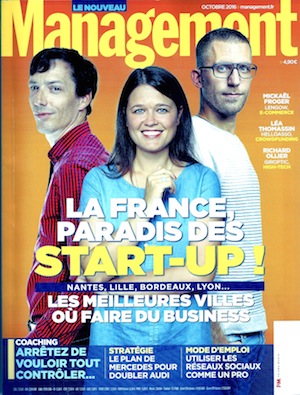par Laurent Mignard
Conductor, pianist and composer, Duke Ellington revealed himself to be a leader ‘Beyond Category’ who changed the world. A creative visionary, he led an exceptional band by relying on solid principles and the art of listening.
Explore the Duke Ellington Attitude
As the leader of the Duke Orchestra, Laurent Mignard is recognized as the most deserving ambassador of Duke Ellington. Through his conferences, he delivers the keys to the maestro’s success, revealing his charismatic leadership and management through listening, unveiling the collaborative process and the role of the soloist, recounting his own experience and activating the emotional side.
Lectures
- Orchestrate Talent
- In heart of the orchestra (quintet, big band)
- Change and agility
- The art of the Human Relations
- Jazz leadership
Key words : listening, inclusion, shared vision, recruiting and motivating, animating talents, the art of guidance, the expectations and responsibilities of soloists, provoking skill, accepting responsibility for mistakes, interpretation vs improvisation.
References
Over 200 lectures : ACEF, Adrea mutuelle, AFDS Rennes, AG2R La Mondiale, Airbus, Allen & Overy, Allianz, Amundi, Arkea, Audika, Aurige, Automotive Cells Company, Axa, Banque Populaire Med, Beyond Associés, BBGR, BDR Thermea, BNP Paribas, Caisse d’Épargne, CCI Nantes Saint-Nazaire, Cartier, Celgene, Cerfrance, Certinergy, CHU Rennes, CHU Reims, CJD Clermont Ferrand et Nancy, Cora, CRCC Dijon, Limoges et Orleans, Credit Agricole CIB, Credit Du Nord, Crédit Immobilier de France, Credit Mutuel assurances, Ecolab, EDF, EDF Commerce, EDF Ingeum, Edf Hydro, Engie, Engie Solutions, Enedis, Entrepose, Entreprise & Progrès, ERDF, Essilor, Family Business Network, Fédération des Entreprises et Entrepreneurs de France, Ford, France TV, Generali, Giboire, Gide avocats, Groupama, Groupe Prévoir, Hachette, Hatier, HEC, Club Heliom, HRA Pharma, Indigo Park, Intermarché, Isara, Isefac, Janssen, Kedge Business School, Leclerc Galec, Leclerc Unilec, Lilly, LogiEst, Malakoff, LPA CGR Avocats, Mars-Wrigley, Medef Grand Lille, Médéric, Michelin, Mundipharma, MX, Myers-Briggs, Natixis assurances, Naval Group, Nomura, Ocealia, Orange Ile de France, Orange Bank, Orange Business services, Orexad Rubix, Partnerre, Pierre&Territoires, Laboratoire Pileje, Pilot, Groupe Pochet, La Poste, La Poste Colissimo, Premier Monde expertise, Quick/Burger King, Randstad, Record, Report One, Reuters, Salesforce, Sandoz, Sanofi, Saur, SIMU, SNCF réseau, SNCF innovation, Sonorium, Societé Générale Gbis Finance, Societé Générale Immobilier, Sommet Education, Groupe Soufflet, STEF, Suravenir Arkea, Telstar, TF1, Thales, Total gaz, lubrifiant et juridique), Unibail GB, Université Dauphine, VDL Conseil, Véolia Water Technologies et DOP, Villages Club du Soleil, Vinci…
Duke Ellington – more information
On the occasion of his jubilee, Duke Ellington (1899-1974) heard that he was the greatest American composer, honored worldwide: nearly 1,000 compositions and more than 3,000 arrangements, more than 20,000 concerts in the USA and worldwide, American citizen of honour, White House Freedom Medal, Legion of Honour in France, 4 countries have issued stamps bearing his image…

« I owe everything to my soloists » – Duke Ellington
Insatiable worker, he crossed the 20th century with constancy, tending towards his dream of elevation of the Human Being by the arts, over a professional career that was anything but a long quiet river, bypassing the pitfalls: social and economic difficulties, the management of men and especially the changes of modes…
The exemplarity of Duke Ellington lies in a leadership of self-esteem, a management by listening and the recognition towards all those who helped him to accomplish his project.
Duke’s identity leadership has been built on an extraordinary alignment of his environment, behavior, skills, beliefs, identity and spirituality. With a fair level of self-esteem, and activating an emotional charisma, the Duke became convinced that nothing serious could ever happen to him, and created a world to which everyone wanted to belong.
Duke’s management focused on listening, inclusion and letting go, guided by the right level of control (“Know how to do a thing or two … and leave the rest to others”). Since everyone had to think that he was important, he encouraged to «be oneself» and showed the way without giving instructions. When he needed something for the musical project, he asked it as a favor. For 50 years, his musicians followed him with confidence and respect. Master its fundamentals, work hard, stimulate intuition, be combative, recognize and value talents, delegate, give confidence, encourage tutoring, show empathy, rely on the point of view of the other, involve emotionally, make others better than themselves… This exceptional conductor animated much more than a team, a real professional family.
On the artistic side (the heart of the project), Duke Ellington perpetually aimed for excellence, working on his works until the last minute, and constantly taking them back. Far from having received divine inspiration, he drew his ideas from his environment and evolved in a constant listening position («I do not believe in analysis, but in listening»), impregnating and recycling all the materials that passed within his reach, If it sounds good, then it’s good. Encouraged by the maestro, the musicians played a central role in this creative process, bringing the best of themselves and participating in building the common project (ideas, melodies, sounds, etc.). In concert, Ellington gave them a large place, encouraged their improvisations that could then be noted in the composition of the moment or recycled into new works. And when the compositions came from his musicians, he never forgot to credit them, while arranging them with his particular touch (recognition by the public of the «Ellington effect»).
Ellington did not invent this collaborative model, which existed from the origins of jazz, but he pushed the exercise to its extreme. Today, with or without a conductor, most jazzmen collaborate on a common project, defined and shared very upstream. From saxophonist to drummer to bassist, each works in the service of the other, and all work for each, alternately soloists and then accompanist within the same piece. Orchestra direction is no longer vertical, but horizontal. Everyone feels concerned, ready to give the best of himself, because he knows that music will make him hundredfold.



